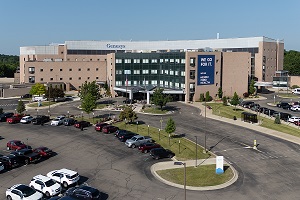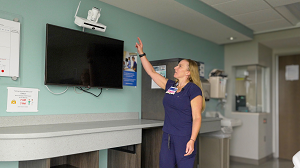Triumphant Trio: Henry Ford Transplant Warrior Inspires Double Transplant Patient, Nurse to Run Alongside Him

“I woke up this morning and I said, ‘that seemed like a dream.’ It was truly one of the greatest days of my life,” said Jeff Muller, breaking into a genuine smile that never seemed to fade from his face.
Muller, 53, who lives just outside of Grand Rapids, has been recovering from a second liver transplant for just over a year. An enthusiastic runner his entire life, he has been easing back into his passion, thanks to another liver transplant recipient, 54-year-old David Galbenski of Grosse Pointe Shores. The two recently completed the 2023 Detroit Free Press International Half Marathon alongside Henry Ford Nurse Practitioner Karen Ostrowski, who was inspired to run with them.
“Dave is not somebody you can say no to — he’s a force of nature,” Ostrowski said of Galbenski. “He’s just so positive! And it’s simply incredible to see where Jeff is today.”
Ostrowski, who has long worked the night shift, cared for both Muller and Galbenski during their respective transplant surgeries. It was in the summer of 2022, before Muller’s first transplant surgery, that Ostrowski thought the two patients should speak.
It was brutal.
“Jeff suffered for three months straight, and it was just awful to see,” said Ostrowski. “He was not himself. He was so sad and manic from the steroids he had to be on. I would sit in his room and talk to him because he was so restless. He just knew it wasn’t going well, and he was at high risk of death, or he thought he’d be crippled for the rest of his life. It was absolutely brutal.”
Knowing Galbenski’s positive outcome from his liver transplant, Ostrowski called him, thinking he could chat with Muller and, perhaps, they could enjoy a few phone conversations and discuss their love for running. But of course, Galbenski did what he does: he exceeded expectations and visited Muller in his Henry Ford Hospital room.
“It’s about being open and connecting with other people when they’re in need,” said Galbenski. “With Jeff, we just connected. He was in a place where he needed hope. He needed inspiration. He needed to see a better future for himself -- that he could resume activities – that he could get back to doing what he loved doing.”
“It sounds cliché, but I don’t think I would have ever gotten back into running if it weren’t for Dave,” Muller said. “God knows how much I love running and knows how much was taken away from me because of this. We all know Dave is a blessing, but I truly believe God used Dave to give me back something that I love, too.”
 During that turbulent time in which Muller was waiting for a transplant, he could not walk to the bathroom on his own, and he did not know if he would even make it through surgery. But he remembers Galbenski saying to him, as they both gazed with wonder and hope out his hospital window at Henry Ford Hospital in Detroit: “You see that Ambassador Bridge out there? We’re going to run that.”
During that turbulent time in which Muller was waiting for a transplant, he could not walk to the bathroom on his own, and he did not know if he would even make it through surgery. But he remembers Galbenski saying to him, as they both gazed with wonder and hope out his hospital window at Henry Ford Hospital in Detroit: “You see that Ambassador Bridge out there? We’re going to run that.”
“He was experiencing what I had been experiencing,” said Galbenski. “To me, it was just gratitude for the ability to be there, because I can’t take for granted that I’m alive today. That was thanks to the gift of my brother-in-law, Mark Dybis, who stepped forward and saved my life as a living donor. And so, in those moments, it’s just putting yourself into the shoes of the other individual who doesn’t know if they’re going to be alive in the future – and if they are, if they’re going to have the opportunity to do what they love again.”
Muller, unfortunately, had complications with his first liver transplant and lost roughly 50 pounds in just 90 days. Some of his darkest days slowly sank in, but by December of 2022, just three months after his second transplant, Muller noticed, quite suddenly, that his pain was gone. He began to feel full of life again and couldn’t stop thinking about lacing up his running shoes.
But instead of just thinking about it, he started to do it. He even mustered enough energy to run a 5K in May of 2023. Soon, he was training for the marathon in Detroit using the “run one minute, walk one minute” method.
Two liver transplants, but this was harder.
“Training for this was the hardest thing I’ve done in my life,” Muller said. “I went through two liver transplants, but training for this race was harder than that! I’m normally 200 pounds, so going from having zero muscle and being 145 pounds – it felt like a blowtorch on my calves.”
Muller didn’t know how the race was going to go. Not only was he not sure if he was going to finish, but he wasn’t sure if he was going to be able to run most of it — or, any of it. For some motivation, he asked Ostrowski—his former nurse who decided to train alongside the duo—to take him up to the Intensive Care Unit two days before the race.
“It was all fuzzy back then – I was on heavy drugs; I couldn’t really remember much of it,” Jeff said. “I walked the halls and recalled so many hard days. Then, I walked into one of the hospital rooms, looked out the window at the Ambassador Bridge, but instead of thinking ‘maybe someday,’ I was thinking, ‘oh my gosh! I’m doing this!’”
As race day began, the crisp morning air filled their lungs and the trio said from start to finish they felt utterly inspired – by one another.
“I’d been praying! I said these words: ‘pray for supernatural strength,’ because it’s going to take supernatural strength to go all the way through this,” said Muller. “And I could’ve kept running!”
The sunrise at the Ambassador Bridge wasn’t the only sign they all knew they were where they were supposed to be. That October morning, Galbenski, alongside Ostrowski and Muller, spotted something special.
Let me tell you about that billboard…
“I love butterflies,” said Galbenski. “It’s how the world speaks to me. In early September of 2019, my liver was continuing to die, and I didn’t know if I was going to get a donor. I went for a run. I didn’t know if I was going to be alive. I was tired, my liver was failing, I was itching. Suddenly, I saw this beautiful Monarch butterfly. I thought, ‘Cool, this is how God speaks to me.’ I keep running. Then another one. And another one. And about 20 Monarch butterflies were zipping in and out as I ran. And two days later, [my brother-in-law] Mark called me. That’s when I found out he was going to become my living donor.
“So, when the marathon rolled around, I looked up right at the start of the race, and there was a giant billboard right on Detroit’s Fort Street of a beautiful Monarch butterfly,” Galbenski said. “I’m like, ‘Are you kidding me!’ If we can just be present and aware of what’s around us, that’s when the magic happens!”
They all finished the race, but Ostrowski—inspiring her running mates and teammates bother – kept on moving; she went into work to take care of more transplant patients after finishing her first half marathon.
 “She worked her normal shift, 7:00 p.m. to 7:00 a.m.,” Galbenski said. “That’s what’s so incredible and inspiring about her. She wore her medal on the transplant floor. She was showing the video to transplant patients. That’s how special she is.”
“She worked her normal shift, 7:00 p.m. to 7:00 a.m.,” Galbenski said. “That’s what’s so incredible and inspiring about her. She wore her medal on the transplant floor. She was showing the video to transplant patients. That’s how special she is.”
“Dave has such a generous heart. It helped lift me the rest of the way,” said Ostrowski. “And Jeff — he just pushed himself. He believed he could do it. It was the coolest thing I’ve ever seen. I’m still on a high from running and watching Jeff. Nothing will hold him back now.”
Muller, who is already strategizing their race for next year, said it could not have been a more perfect day.
“Rare in life is it that you paint a vision where part of you thinks it’s impossible and then you actually achieve it,” Jeff said, with his smile, still, radiating across his face. “I’m just still trying to process it.”
###
MEDIA CONTACT: mediarelations@hfhs.org
.svg?iar=0&hash=F6049510E33E4E6D8196C26CCC0A64A4)

/hfh-logo-main--white.svg?iar=0&hash=ED491CBFADFB7670FAE94559C98D7798)





